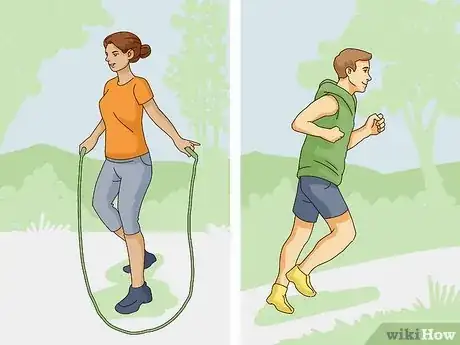This article was co-authored by Tasha Rube, LMSW. Tasha Rube is a Licensed Social Worker based in Kansas City, Kansas. Tasha is affiliated with the Dwight D. Eisenhower VA Medical Center in Leavenworth, Kansas. She received her Masters of Social Work (MSW) from the University of Missouri in 2014.
There are 12 references cited in this article, which can be found at the bottom of the page.
This article has been viewed 62,808 times.
Although many view this developmental period as totally carefree, teenage life features many of the stressors of adult life. If you are a teen, you might be struggling to keep your grades up and consider colleges while managing a part-time job and a thriving social life. All of these moving pieces can easily make you feel like an incompetent circus clown, dropping more balls than you juggle. Learn to balance your teen life by effectively handling stress, managing school and other responsibilities, and focusing on positive relationships.
Steps
Coping with Stress
-
1Get a hobby. Having something to do that you enjoy can enhance the balance in your life as a teen. You might be a part of extracurricular activities, but these responsibilities may not necessarily classify as “fun.” You may not have even chosen them for yourself; a parent may be influenced you to join. Find an activity that you like to engage in regularly.[1]
- Hobbies give you a chance to pursue and develop new skills, relax, and meet people. Try joining an interesting club or organization at your school or in the community that’s not related to academics. Join a swim team at the local YMCA. Volunteer at an animal shelter. Learn to play a musical instrument.
- A hobby should be an activity that you enjoy doing for yourself--not because your mom or dad says so. Choose an activity that you can engage in regularly. But keep in mind that there's no pressure. If you feel like doing it, do it. If not, do something else. Don't view it as an obligation like school sports or clubs.
-
2Stay physically active. Regular exercise is an important element to leading a healthy life. When you exercise, your body produces chemicals called endorphins that lift your mood. In addition to a mood-boost, physical activity can also help you manage your weight, fight stress, and even improves academic performance.[2]
- Opt for 30-60 minutes of exercise on most days of the week with activities like running, hiking, rowing, or dancing.
- Remember that you get the greatest benefit from physical activity when you eat a balanced diet. Be sure to eat plenty of fruits and vegetables, whole grains, and lean proteins.
Advertisement -
3Journal. As a teen, it can be a challenge to articulate your feelings sometimes. Writing out your thoughts and feelings in a journal offers an outlet to help you manage stress and problem-solve.
- Find a nice notebook and pen. Unplug from technology for an hour and sit down to write. You might simply outline the happenings of your day, create stories or poems, or list some things you are grateful for.[3]
- You may also utilize this time to reflect on stressors. Remind yourself that the stressful past events were only temporary. Treat your experiences as learning opportunities to help you get through any current situations. Your journal can help you reflect and strategize.
- Plus, you're only a teen once, and when you're an adult looking to stroll down Memory Lane, you'll be glad to have such mementos and reminders.
-
4Learn mindfulness. Teens have busy lives. You may often feel like the days are flying by and you have very little connection to individual moments. You can reconnect to the present moment by practicing mindfulness. This activity helps you slow down and focus on the here and now. You can do it virtually anywhere, too.
- Try fully focusing as you eat dinner each day. Don’t watch TV or other entertainment. Fix a plate of food and eat it slowly. Notice the different flavors, textures, and smells.
- Another approach is to just sit in silence and focus on your five senses. Pay attention to the sights, sounds, touches, or smells around you.[4]
-
5Practice relaxation techniques. Practicing meditation and breathwork can help you relax and keep your mind in the present moment. It helps to slow down racing thoughts, and anxiety about your present situation or the future. Regular meditation can have a positive effect on the body, as well.[5]
- For instance if you're experiencing anxiety with a racing heartbeat and rapid breathing, relaxation techniques can help bring these symptoms back to a more normal level.
-
6Get adequate rest. Failing to get enough shut-eye can undermine your academic performance and make you irritable. It’s important for you to get enough sleep to develop your body and boost brainpower. Teenagers should get about 8 to 10 hours of sleep each night.[6]
- If you find getting to sleep challenging, it may help to create a nighttime routine. An hour or so before bed, wind down by turning off your phone, TV, and computer. Take a warm bath, listen to calming music, or do some light reading.
Juggling School and Responsibilities
-
1Identify your priorities. Life can quickly fall out of balance if you don’t have your priorities straight. Think about the activities and task that are most important (or have the greatest urgency) to you, and focus on them. This way you’re not bogged down trying to do everything.[7]
- You can identify priorities by spending a little time each Sunday thinking about the demands of the week ahead. Jot down any important events or appointments, projects or tests, and chores/responsibilities.
- Then, go through and create a practical schedule for each day that includes all your priorities. If you have gotten the most important things out of the way, you will feel more inclined to relax.
-
2Set objective goals. It’s great to have big goals, but sometimes having high expectations can lead to frustration and dissatisfaction. Be realistic about what you’re taking on in terms of your academic course load, extracurricular activities, work responsibilities, and social engagements. Review your goals to make sure they are feasible. Then, take small action towards them daily.
- For instance, you might want to become a better trumpet player. This goal is awesome, but it’s unclear. Saying, “I will practice for 30 minutes five days a week” offers a much more doable way to obtain the goal.[8]
-
3Break down big projects into smaller segments. Huge projects and assignments can wear away at your sanity. You may feel overwhelmed at the magnitude of work you must put in to complete the task. It helps to divide large projects into smaller pieces. Then, set deadlines for you to complete each individual part until the entire project is finished.[9]
- For instance, if you have a five-page history paper, you might start by doing research. Then, outline your paper. Write a rough draft. Review your resources, edit and rewrite. Then, proofread again before submitting it.
-
4Ask for help when you need it. Be willing to admit when you’re in over your head. Life gets busy for everyone, so you won’t be judged for confessing to being overwhelmed. Talk to a friend, parent, teacher or counselor. These people may be able to offer advice or resources to help you cope.[10]
Handling Relationships
-
1Make friends who are positive influences. When you hang out with people who support and value who you are as a person, life feels more manageable. Plus, hanging with negative influences often adds more trouble to your life, such as a bad reputation or failing grades. Form relationships with positive peers from school organizations, sports groups, or community organizations.
- Healthy friendships involve two people who care for on another, respect each other’s boundaries, and have mutual goals and interests.[11]
- Stay away from peers who bully, manipulate, lie, skip classes or use drugs and alcohol.
-
2Take dating slow. When your parents give you the OK to date, you might immediately fall down a rabbit hole. You become obsessed with your date, pick up their habits, and even drop your hobbies in favor of theirs. Although it’s wonderful to want to show your partner that you sincerely care for them, it’s also smart to maintain some balance.[12]
- Slow down and move at a pace you are comfortable with. Let your date know what you will and won’t accept. Don’t become physically intimate with them until you are absolutely ready.
- What’s more, don’t drop your old life when you get a new relationship. Stay in touch with your friends and keep participating in your favorite hobbies. It’s important for healthy relationships to involve some space for you to pursue separate interests.
-
3Spend time with family often. Friendships and romantic relationships often overshadow familial bonds during the teen years because you may feel like your peers naturally understand you better. Still, it’s essential to have positive family interactions, too. Maintain a balance of peer time and family time.
- Sit down to meals with your family rather than eating on the go. Walk your younger siblings to school or the local park. Find a TV show you can watch with a parent for one-on-one bonding time. Offer to stay home one weekend for a family game night.
-
4Schedule time away for yourself. Be open about your personal needs. Sometimes, life is just too much. Don’t feel guilty about cancelling plans or saying “no” to a new responsibility. It’s important to recognize when you need time to regroup and take it.[13]
- It can help to schedule in some “me-time” each week. This may be a few hours of self-care or a full afternoon set aside to treat yourself. Nap, watch movies, read, or take a reflective walk in nature to ease your mind.
References
- ↑ https://www.healthyfamiliesbc.ca/home/articles/extracurricular-activities-interests-and-hobbies-teens
- ↑ https://www.cdc.gov/healthyschools/physicalactivity/facts.htm
- ↑ http://www.huffingtonpost.com/2013/02/13/5-ways-keeping-a-journal-_n_2671735.html
- ↑ http://youth.anxietybc.com/mindfulness-exercises
- ↑ http://www.mayoclinic.org/healthy-lifestyle/stress-management/in-depth/relaxation-technique/art-20045368
- ↑ https://sleepfoundation.org/sleep-topics/teens-and-sleep
- ↑ http://www.pamf.org/teen/life/stress/lifebalance.html
- ↑ http://kidshealth.org/en/teens/goals-tips.html
- ↑ http://columns.uga.edu/news/article/break-large-tasks-down-into-smaller-more-manageable-pieces/
- ↑ http://www.pamf.org/teen/life/stress/lifebalance.html
- ↑ http://msue.anr.msu.edu/news/helping_teens_develop_positive_friendships
- ↑ https://www.healthychildren.org/English/ages-stages/teen/dating-sex/Pages/When-To-Let-Your-Teenager-Start-Dating.aspx
- ↑ http://www.huffingtonpost.com/morgan-levy/teen-stress_b_5603356.html










































































